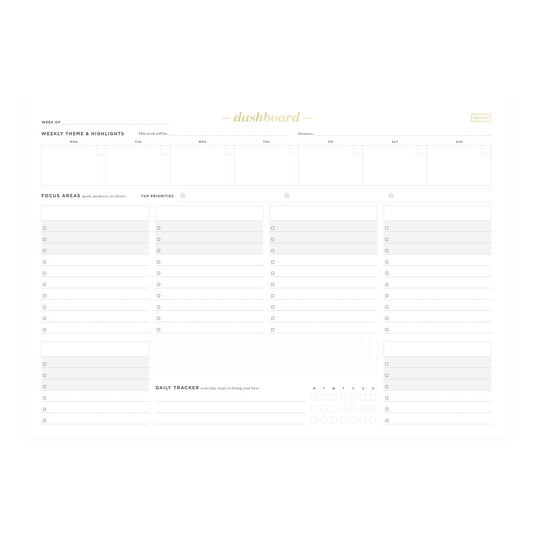During unpredictable times, it’s still important to add structure to our days and make a plan.
Why is planning so important?
As human beings, it’s in our nature to plan and prepare. In fact, setting goals and making plans can positively contribute to your well-being and help you cope during unpredictable times.
I like to think of plans as recipes for your days. You might not always have the energy to prepare the dish or have the perfect ingredients on hand and the recipe might not turn out as you had hoped, but having a plan is a good place to start from.
Making plans during an unpredictable time may seem futile. Why bother when we don’t know what tomorrow brings? But we have to remember that life has always been uncertain. We might not know what the future holds, and some periods in life might be more unpredictable than others, but that doesn’t mean our lives have to remain at a stand still. We have to find new ways to adapt, change course, and live our lives.
Below you’ll find ways to make simple and manageable plans during an overwhelming time.
Create goals that focus on process, not outcome
When life is unpredictable, it’s hard to imagine what you’ll want to be doing in a few months, let alone in a year. During times of uncertainty, it’s good to try to shift your focus to mini-goals and things that you can plan in the near term.
When creating goals during uncertain times, try to focus on process-oriented goals. We may not be able to control the outcome, but we can manage the process and how we go about doing things. So instead of setting a goal that requires a specific outcome like “I will make $1,000 more in earnings this month” you can modify this goal to be about the process, such as “I will reach out to 5 potential clients this month.”
Other examples of process-oriented goals include:
- Reading a book a month
- Making one new recipe a week
- Researching ideas for your novel or screenplay
- Learning how to knit
- Cleaning and organizing your house
Set short-term goals
Next, think about setting an end-date for these goals. Does a year-long goal seem too far-off in the distance and difficult to wrap your head around? Then aim for setting 3-month goals instead. It’s enough time to work on your goals, but still close enough in the future that it’s easier to think about.
So if your goal is to research grad school programs, give yourself 3 months to plan and execute your project. After that 3-month period ends, build off your momentum to plan for another 3-month goal.
If quarterly goals seem overwhelming, focus your attention to weekly goals or even daily goals. Find a time-range that is most comfortable for you.
Create a Top 3 to-do list
To-do lists can be a great comfort during a rough time, but a too-long list can create more stress than it cures. Giving your to-do list a simple format and a sense of focus can help you actually accomplish things, rather than spiraling and feeling stressed out.
I like to use the Ink+Volt Top 3 Today Pad and ask:
- What are easy, practical things that I can achieve today?
- What will make the most difference if I complete it today?
- What is one thing that will make me feel good to get done?
When you're focused, you can't fail. Picking your top 3 things to accomplish each day gives you a way to structure your days without overwhelming yourself with details you can't complete.
Establish a routine
Routines are sometimes associated with boring people or people stuck in a rut, but during turbulent times, a routine can be a life preserver.
When we don’t know what lies ahead, we have to find a way to build structure into our days. And we can learn about structure and routine from people like endurance athletes, astronauts, and arctic explorers--these are all individuals who have had to work in isolated environments and often in harsh weather conditions in order to achieve their goals.
In this New York Times article about endurance athletes, we learn that the key to enduring these difficult conditions is to establish a steady routine. Knowing what you have to do every morning can be a stabilizing force.
Maybe your daily routine means taking energizing walks in the morning or establishing a daily gratitude practice or checking in with friends and family or writing three pages in your journal or making a pot of your favorite coffee. These are all elements of your life that you can manage and easily achieve.
Have things to look forward to
In addition to setting goals, it’s important to have things to look forward to and celebrate. I like to enter things I’m looking forward to in my planner, like phone dates with friends or release dates of books and movies that I’m excited about.
If cooking is your thing, maybe you can plan a Sunday roast or a Friday night dessert to help you celebrate the weekend. Or you can plan a virtual book club with friends or a volunteer project in your neighborhood.
You can even plan something as simple as lighting a candle after you finish your work or curling up with a page-turning book after finishing your chores. It doesn’t matter how small or quotidian this event may seem, but the sheer act of planning it and looking forward to it will make your day that much brighter.
Learn a new skill or hobby
When endurance athletes are trying to overcome a challenging part of the competition or are struggling with an injury, they’ll shift their focus to something new. This way, you’re shifting attention away from pain and onto the new thing.
What is a hobby or skill you’ve always wanted to try but never had the time for? Maybe it’s gardening or taking a virtual dance class or playing scrabble.
Are you exhausted by classes and learning new things? Then focus your energy on new projects. Maybe that means organizing your garage or planning a virtual birthday party for a friend or organizing a little free library in your neighborhood. Whatever it is, you’ll benefit from having a project to occupy your skills and energy, while also gaining a sense of accomplishment in the process.
Celebrate your wins
When life gets intense and surreal, making plans can help us feel centered. In fact, the mere act of making a plan and setting a goal can sometimes feel just as satisfying as achieving a goal. Even if you don’t accomplish the big, year-end goal, you will feel just as fulfilled in accomplishing mini goals.
That’s why it’s important to celebrate your wins, big and small, especially during intense times.
In your Ink+Volt Goal Planner, there’s a section called “Celebrate and Reflect.” Here’s where you can write down all your achievements for the week--and don’t hold back. You can list everything from sending out emails to loved ones, making the bed, eating greens for every meal, making dinner from scratch, and going on a walk everyday. These are all worthy accomplishments that deserve to be celebrated. And during intense times, it’s always nice to have more reasons to celebrate.
We may not always know how our days will unfold, but plans can provide scaffolding for our days. Things may not always go as intended, but as long as we have a solid, but flexible structure, we can weather the storm.









